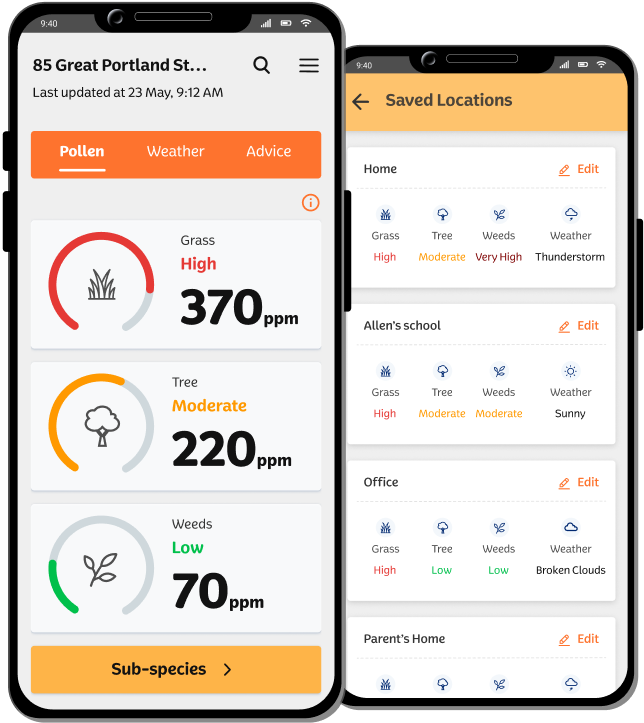Allergy suffers still can’t catch a break – even when you’re asleep. Allergies at night are common, uncomfortable, and pretty frustrating. You might struggle more with your allergies at night-time due to increased exposure to the allergy trigger, and the fact that you may be more aware of your symptoms. There’s less to distract you from your pesky sneezing, scratchy throat and blocked nose when you’re lying down trying to get some sweet shuteye.
We’ve put together some tips on how to get to sleep soundly if you’re suffering with hay fever symptoms so you can tell them to get stuffed.
Why are allergies worse at night?
There’s nothing worse than a stuffy nose at night – and sadly allergies always seem to get worse when you’re super tired and looking forward to a decent night’s sleep.
Your allergies will be worse at night thanks to the pollen levels in the air. Heat rises throughout the day – so the pollen in the air also rises. When the air starts to cool down in the evening, the pollen starts to travel downwards, making your allergies worse.
Typically, pollen usually falls to the ground between the hours of 8pm and 10pm – which coincidently happens to be the time that many people start to get ready for bed.
Hay fever at night is often worse in rural locations and stormy nights. This is due to the increased concentration of trees, shrubs and grass in your local area and the allergy triggers they release.
We understand that night allergies are inconvenient and can cause people to struggle to get a good night’s sleep. Here are some of our top tips to get the better of your pesky pollen allergies at night:
Take a shower before bed
Something as simple as taking a shower before bed can make a big difference to sleeping with allergies. The steam from a shower can help to clear your sinuses and blast away any allergens that may irritate your eyes or nasal passages. You could even use eucalyptus products while you shower to help unblock your sinuses even more.
This bedtime routine can also help you relax and unwind after a long day, making it easier for you to switch off and go to sleep.
Close windows & shut doors
Although the cool spring breeze may feel nice, it’s not good news for your allergies. Close any windows and doors into your bedroom to help keep pesky allergen particles away. It may also help to prevent any blowing in while you’re asleep when the cooling air causes the particles to fall.
Make sure your room is clean
A clean, uncluttered space will benefit your sleeping habits in more ways than one. Not only will you find it easier to relax and unwind, but your room will be easier to keep clean – limiting the build-up of dust particles. This may help to reduce your allergy triggers and you to sleep more soundly at night. Pay extra attention to skirting boards and surfaces where dust may creep in undetected.
Cover your bed with a sheet during the day
Add an extra layer of protection to your bed by covering it with a sheet during the day. That way, if any pollen particles have drifted into your bedroom during the day, they will only have fallen on the cover – not your bed itself. When it comes to sleeping you can remove this cover and lie on a nice clean bed.
Wash your bedding frequently
Staying on top of your laundry will significantly help with your allergies too, by removing any pollen particles that may have built up on your bed. If possible, try to dry your sheets inside too. This can help to avoid any pesky particles clinging to them while they’re hanging out to try.
Get an air purifier
An air purifier could significantly improve the quality of air around you when you’re sleeping. They’re great for removing dust mites, pet dander, mould and pollen that could get into your room via your clothes, hair or skin. It could also help with removing odours and make your room more comfortable to sleep in.
Tie up long hair
Pollen particles from the day can get stuck or caught in your hair – especially if you have long locks. This is why it can be a good idea to wash your hair before going to bed to remove the risk of any particles sticking around. Or to tie your hair up to keep them away from your face.
Stay away from dairy products before bed
It could help to avoid eating or drinking dairy products right before bed. Not only to avoid nightmares, but because dairy increases the risk of allergy symptoms. It causes a build-up of mucus. This mucus buildup can make hay fever snoring much worse.
It can also help if you eat your last before earlier in the evening. Sleeping on a full stomach may cause extra pressure on your chest and lungs – and make your snoring worse. Try to eat four hours before you sleep, to make sure that your meal is on the way to being digested before your shuteye.
Eating foods containing Vitamin E may be helpful before bed too, to help give your immune system an added boost.
Take allergy medication
You may benefit from taking over-the-counter allergy medication before you go to bed if your symptoms are severe – like antihistamine. Make sure to consult your doctor first before taking any medication.
While it can be hard to avoid those pesky allergies from striking, it can help to be prepared. Use our Pollen Pal tracker to check the pollen levels in your area in advance to try and tackle your hay fever head on.


















